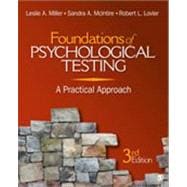
| Overview of Psychological Testing | |
| What Are Psychological Tests? | |
| Why Should You Care About Psychological Testing? | |
| What Are Psychological Tests? | |
| The History of Psychological Testing | |
| Testing Today | |
| The Defining Characteristics of Psychological Tests | |
| Assumptions of Psychological Tests | |
| Test Classification Methods | |
| Psychological Assessment, Psychological Tests, Measurements, and Surveys | |
| Locating Information About Tests | |
| Why Is Psychological Testing Important? | |
| The Importance of Psychological Testing | |
| Who Uses Psychological Tests and for What Reasons? | |
| The Social and Legal Implications of Psychological Testing | |
| Is There a Right or Wrong Way to Use Psychological Tests? | |
| Ethical Standards for Psychological Testing | |
| Appropriate Use of Psychological Tests | |
| Testing Special Populations | |
| How Does Computerized Testing Work? | |
| Computerized Testing | |
| Computerized Adaptive Testing | |
| Web-Based Assessment | |
| Implications for the Future | |
| Psychometric Principles | |
| How Do Test Users Interpret Test Scores? | |
| Levels of Measurement | |
| Procedures for Interpreting Test Scores | |
| Standard Scores | |
| The Role of Norms | |
| What Is Test Reliability? | |
| What Is Reliability? | |
| Three Types of Reliability | |
| Classical Test Theory | |
| The Reliability Coefficient | |
| Using Computer Software to Calculate Reliability | |
| Interpreting Reliability Coefficients | |
| Factors That Influence Reliability | |
| Generalizability Theory | |
| How Do We Gather Evidence of Validity Based the Content of a Test? | |
| Different Sources of Evidence for Validity | |
| The Appropriate Use of Various Validation Strategies | |
| Evidence Based on Test Content / Content Validity | |
| Face Validity | |
| How Do We Gather Evidence of Validity Based a Test's Relationships with External Criteria | |
| What Is Evidence for Validity Based on Test-Criteria Relationships? | |
| Methods for Providing Evidence of Validity Based on Test-Criteria Relationships | |
| Selecting a Criterion | |
| Does the Criterion Measure What It Is Supposed to Measure? | |
| Calculating and Evaluating Validity Coefficients | |
| Using Validity Information to Make Predictions | |
| Ethical Issues Associated With Test Validation | |
| How do we Gather Evidence of Validity Based on a Test's Relationship with Constructs? | |
| Construct Validity | |
| Gathering Evidence of Construct Validity | |
| Factor Analysis | |
| Developing and Piloting Surveys and Psychological Tests | |
| How Do We Construct, Administer, and Use Survey Data? | |
| What Are Surveys? | |
| Knowledge Acquisition and the Scientific Method | |
| The Survey Research Method | |
| Survey Reliability and Validity | |
| How Do You Develop a Test? | |
| Why Develop a New Test? | |
| Defining the Testing Universe, Audience, and Purpose | |
| Developing a Test Plan | |
| Composing the Test Items | |
| Writing Effective Items | |
| Writing the Instructions for the New Test | |
| How Do We Assess the Psychometric Quality of a Test? | |
| The Pilot Test | |
| Quantitative Item Analysis | |
| Qualitative Item Analysis | |
| Revising the Test | |
| Conducting the Validation Study | |
| Developing Norms and Identifying Cut Scores | |
| Developing the Test Manual | |
| Using Tests in Different Settings | |
| How Are Tests Used in Educational Settings? | |
| Decision Making in the Educational Setting | |
| Educators as Test Users | |
| Psychological Test Use in Educational Settings | |
| Norm-Referenced, Criterion-Referenced, and Authentic Assessment of Achievement | |
| How Are Tests Used in Clinical and Counseling Settings? | |
| Models of Psychological Assessment | |
| Tests Used for Diagnosis and Intervention | |
| Neuropsychological Tests | |
| Specialized Tests for Clinical Disorders | |
| How Do Organizations Use Psychological Tests? | |
| A Short History of Employment Testing | |
| Preemployment Testing | |
| Performance Appraisal | |
| Table of Contents provided by Ingram. All Rights Reserved. |
The New copy of this book will include any supplemental materials advertised. Please check the title of the book to determine if it should include any access cards, study guides, lab manuals, CDs, etc.
The Used, Rental and eBook copies of this book are not guaranteed to include any supplemental materials. Typically, only the book itself is included. This is true even if the title states it includes any access cards, study guides, lab manuals, CDs, etc.